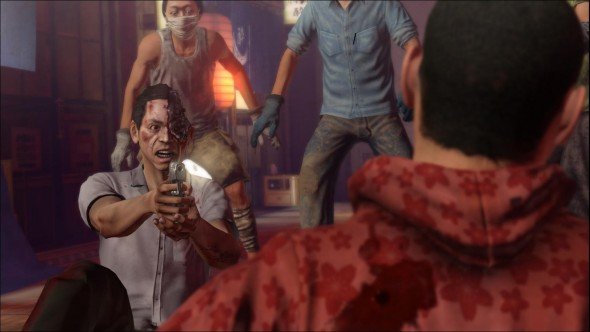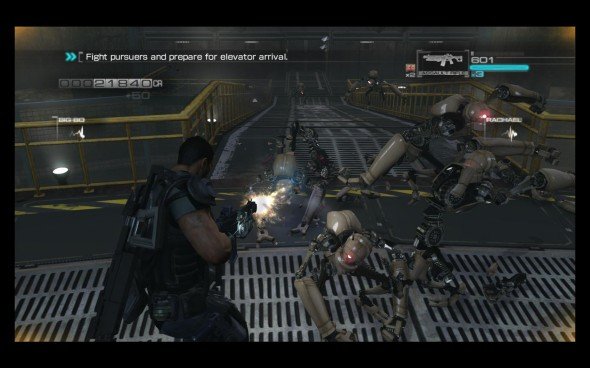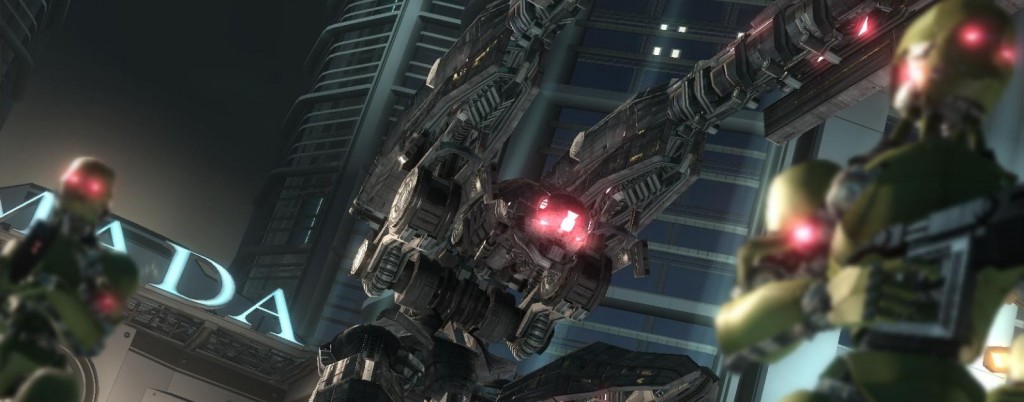Our Verdict
The robots blow up good, but otherwise this ho-hum shooter fumbles its few ideas and is a shonky port to boot.
PC Gamer's got your back
You are Dan, walking jawline, international supersoldier. One of several tasked with infiltrating a futuristic Tokyo. 'Infiltration' in this case means ten hours of noisy third-person gun battles with shiny bipedal gun-bots, to stop a powerful tech company from producing androids that look human.
It's boilerplate stop-and-pop fare in the Gears of War mould, appended with light squad management from Mass Effect, buried in an adolescent parable about artificial life.
You'd hope that this sort of paragraph would constitute the most pertinent information about Binary Domain, but, as a PC gamer, you'll have other things on your mind: namely, why the developers hate you.
The UI designer may never have seen a keyboard: I wasn't even able to identify the icon used to represent 'Tab' during the tutorial. How do I reach the main menu? Oh, that's right, it's 'Enter'. Of course. There's no mouse movement on the menus – WASD to navigate and 'F' to go back. Obviously, in-game, 'F' is the interact key – except when interact is 'Space'. Not that the game tells you this, because the default in-game prompts are those for a 360 control pad, whether or not your input scheme is set to keyboard. Want to change the in-game prompts? Just quit the game, load the separate settings application then restart.

Beneath these annoyances is a largely unremarkable game. Binary Domain does possess a singular forte in the way enemy robots shed their metal skin as bullets rip them up. It satisfies a basic urge to destroy and introduces a frisson of tactics: blow off a robot's head and it'll attack its metallic allies; blow off its legs and it'll crawl on, Terminator-style. Some enemies charge in, others hang back; the combination creates lively, if repetitive, gunplay.
The rest of Binary Domain is less inspiring: worthless teammates, glum locations, wearisome vehicle sections, ghastly boss fights. Its one distinguishing feature is particularly dubious: voice command, used to order your buddies in combat, and to improve your standing with them during down-time. It routinely misunderstands or ignores commands, and even registers them when none have been uttered – despite playing through a headset in the dead silence of my rural home. Even with manual input, the choices it offers frequently make no sense: what does “Damn!” imply when answering a question containing a double negative?
Keep up to date with the most important stories and the best deals, as picked by the PC Gamer team.

Getting this wrong affects your relationships with characters, and with the plot, should you care about it. There are flashes of intellect in the writing, motifs largely purloined from Blade Runner, but the predictable twists are delivered with so many holes you could use the script to strain broccoli.
Nonetheless, Binary Domain wants you to care about its cast, and it makes some headway with Dan and co's goofish wit and well-voiced patter, albeit entirely composed of action movie cliché. But just as frequently it drops the ball: Dan's attempted seduction of designated love-interest Faye is like a clip from a David Lynch nightmare sequence.
Multiplayer brings class-based competitive modes and four-player wave-survival. Should you find an active server, it proves serviceable but seldom-scintillating stuff. And that's Binary Domain to its core: a sometimes competent clone whose unique attempts to ignite enthusiasm sputter out. And if you don't have a control pad, the galling disdain shown to the PC reduces this replicant to so much scrap.
The robots blow up good, but otherwise this ho-hum shooter fumbles its few ideas and is a shonky port to boot.


